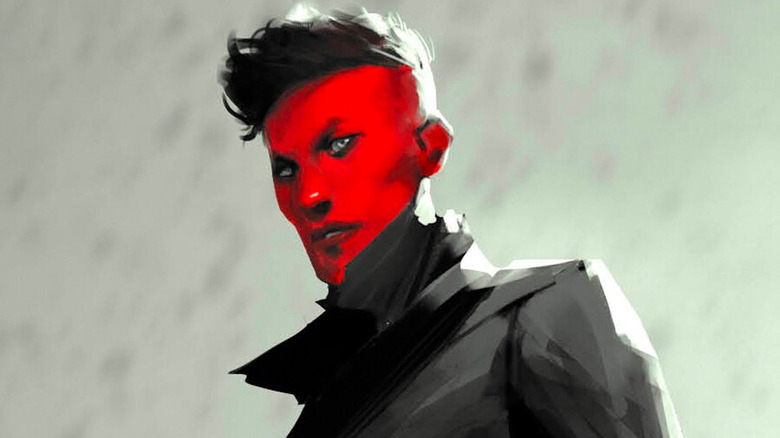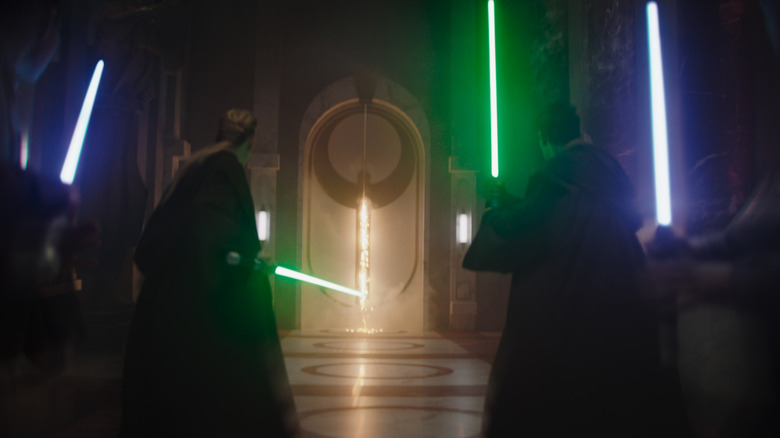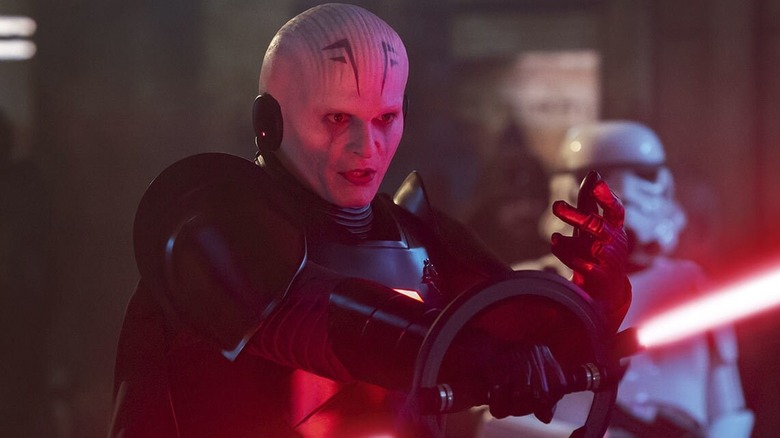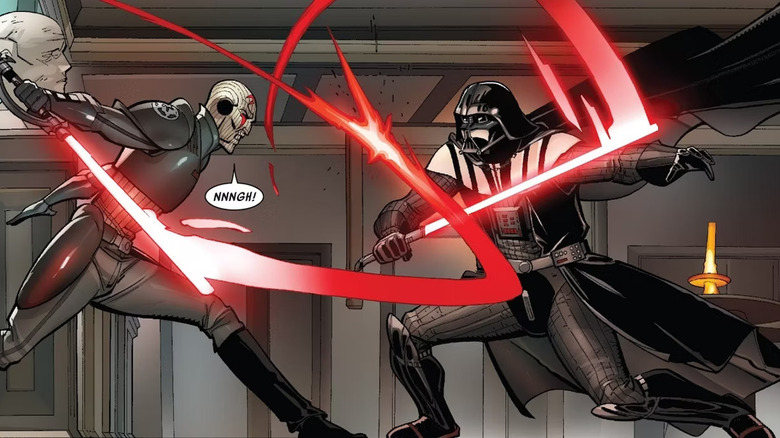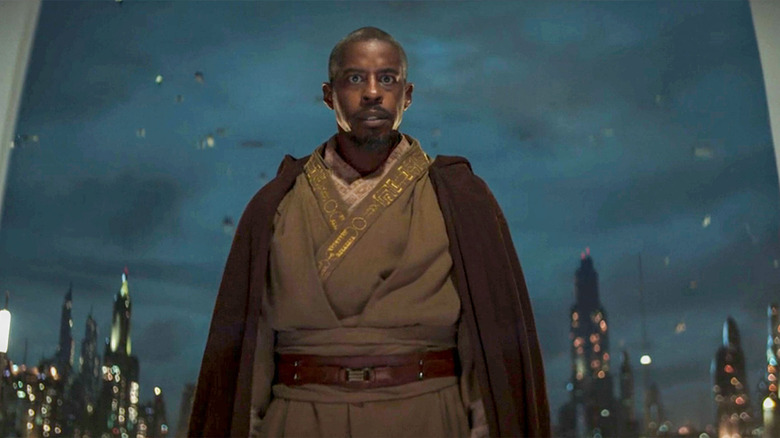Star Wars: Inquisitor - Rise Of The Red Blade Review: A Prequel That Comes Out Swinging
There will be spoilers for "Star Wars: Inquisitor – Rise of the Red Blade" by Delilah Dawson
Delilah Dawson, who has previously penned "Star Wars" novels like "Phasma" and "Black Spire," comes out swinging in the prequel era with "Rise of the Red Blade." This book tells the story of Jedi Padawan Iskat Akaris. She's a member of a species no one seems to recognize and has had an incident in the past that means she's not trusted by the rest of the Jedi. The other Padwans even think she might be dangerous.
When Iskat heads to Geonosis to help Mace Windu extricate Obi-Wan Kenobi and Anakin Skywalker at the onset of the Clone Wars, she finally finds what she's good at, cutting down enemies in the heat of battle. Unfortunately, she loses her master in the conflict and, although she's elevated to the level of Jedi Knight, she is diverted to teaching younglings rather than utilizing her skills in the field. Eventually, near the end of the war, she's able to go on missions for the Jedi and command clone troops. As Order 66 descends on the galaxy, she's given a choice by Darth Sidious himself and when she chooses his way over the Jedi, she's spared from the carnage. Quickly, she finds herself delivered to a mysterious place and in front of the Grand Inquisitor. Her brutal existence as an Inquisitor begins and she's finally able to lead the life she felt destined for.
The Fall of the Jedi
I was surprised through the course of this book how much of it actually happens with Iskat as a Jedi and the crumbling of the Jedi Order. Well over half of the book takes place before Order 66 and shows Iskat's gradual disillusion with the Jedi and their mistreatment of her. Her story parallels Anakin's in some way, where they're truly keeping secrets from her and putting obstacles in her path in the name of "doing what's best for her" even if it's against her will. When I was first introduced to the Inquisitorius and so many of them seemed to be former Jedi, I wondered about what would motivate a Jedi to make that turn. In the book, Delilah Dawson answers all of those questions, showing us exactly how easy that decision would be to make in the face of the treachery of the Jedi and Palpatine's lies about them.
Watching the decay of the Jedi from this angle is something that's ultimately fascinating. Though it bears similarities to Anakin Skywalker's fall, Iskat is her own beast and the way the Jedi fail her is slightly different. All of the Jedi the Order failed, though, are indictments of the hypocrisy and hubris Luke Skywalker told Rey about on Ahch-To. Watching the Jedi through this book makes their fall feel almost inevitable — bearing in mind that we know it is. Dawson is still able to build narrative tension and, once again, allow Order 66's arrival to act as a gut punch.
The Inquisitorius
Though we've seen more and more of the Inquisitorius — first introduced in "Star Wars Rebels" — through things like the "Jedi: Fallen Order" and "Survivor" games, as well as the "Obi-Wan Kenobi" television show and "Darth Vader" comics, it feels like this book really breaths new life into them and how they're structured. It gives us a first-person perspective of the internal workings of the Inquisitorius, as well as how they take missions and operate, and the rivalries that occur inside the organization. Iskat is a great guide through this. Normally, this is not the sort of narrative I enjoy. One of my complaints about almost any books involving the history of the Sith in the old Legends canon is how predictably back-stabby they were and lacked anyone to root for. Delilah Dawson is able to make that feel fresh and make me care about Iskat and the other Inquisitors around her, while also adding depth to characters from other media, like the Seventh Sister (she trained with Aayla Secura!) and Fifth Brother (still a dick!).
We also get a tighter window into the thinking and operations of the Grand Inquisitor. Although it doesn't dive too deeply into him and still leaves many unanswered questions about his character and who he was in the past, it definitely deepens his story and arc from Jedi Temple Guard to leader of the Inquisitorius. It made me wonder if we'd ever end up getting the story of his turn and transition and "Rise of the Red Blade" made me hope Delilah Dawson might get a chance to tell that story.
Vader and the Inquisitors
Darth Vader figures prominently in the narrative and is a genuinely frightening presence. Dawson imbues him with all of the lethal terror he deserves at this part of the timeline. The events of this book also parallel his journey in the current iteration of the "Darth Vader: Dark Lord of the Sith" comic book from Marvel Comics.
In fact, the finale of this book takes sequences from issues 19 and 20 from that book and shows them from Iskat's perspective and adds much more depth to them. You do not need to read those comics to enjoy these moments, but it certainly gets one to sit up and go, "Oh! I see what's going on here!"
The use of Vader here feels so appropriate and a great reason to read the book. If you're a fan of Darth Vader, he adds delicious icing to this already scrumptious cake of a book.
Details to watch out for
If you're looking for other ties to "Star Wars", there are some great breadcrumbs to the broader universe in this book. For one, Iskat is trained to collect artifacts for the Jedi, and naturally that leads her to Bar'leth. For those reading "Star Wars" for a while now, Bar'leth seems to be the center of archeology in the galaxy. It's where the University of Bar'leth is located and where Doctor Aphra and other characters like the Ughnaught Korin Pers studied archeology.
Another character that made his way into this book with his first fiction appearance was Kelleran Beq. Beq first appeared in the YouTube show "Star Wars: Jedi Temple Challenge", played by Ahmed Best. The character was brought into the proper canon in the third season of "The Mandalorian," blowing the minds of everyone when it was revealed he was the one responsible for whisking Grogu from the Jedi Temple as it burned from Order 66. He was a renowned teacher of younglings and Iskat is sent to him to train with her lightsaber.
And what "Star Wars" book these days would be complete without a tie to Galaxy's Edge and the Disney Parks? At one point, Iskat is tasked with retrieving an important slicer named Ginntho. The Separatists want to press him into service and the Republic wants to rescue him and at least give him a choice. He's an Anzellan slicer (Babu Frik was an Anzellan) and it's revealed that he once worked for Dok Ondar on Batuu.
Some of the bigger cameos in the book come with the appearance of Chancellor Palpatine and his alter ego, Darth Sidious. At one point, Palpatine interrupts Iskat's knighting ceremony to let the Jedi Council know about the bombing of Cato Neimodia. This is a direct reference to Mike Chen's equally great book "Star Wars: Brotherhood" which gets into that business on Cato Neimoidia that doesn't count for Obi-Wan Kenobi.
Palpatine appears further, though, when he has a hand in twisting Iskat in some of the same ways he does with Anakin. Although his hand is not as firm with her, we see a few key scenes that show us how he can disillusion Jedi on the fence with some clever philosophy. There's even a speech in the book that feels like Palpatine is basically Ron DeSantis, preaching against being woke. It was a welcome, relevant addition to the tapestry of "Star Wars" that will make the eyes of bigots roll back into their heads. But that's fine.
What matters most
The book moves quickly and keeps you reading. It's like watching out for a pending train wreck, you know you're going to want to see Iskat become an Inquisitor. That's what the book promises, but the journey is so entertaining, it's worth the read.
As far as Iskat, she's a terrific character and my heart breaks for her. On one side, she's essentially red-pilled by Palpatine, but on the other, the Jedi try to put her through their version of conversion therapy. It's no wonder she makes the turns she makes. And the ending of this book is a thrill ride and it feels like it has shared DNA with movies like "Natural Born Killers" or even "True Romance." Like "Thelma and Louise," the ending takes characters off a cliff as they leave to go out their own way and it's a tragic and ultimately beautiful thing. Delilah Dawson has crafted an incredibly readable, entertaining book that deepens the lore of "Star Wars" and gives us a new window into the Inquisitorius.
My only complaint about the book is a minor one and it caused a bit of consternation for me. In one of the chapters, it implies that Iskat is whisked from Coruscant to Geonosis by a Clone pilot. This doesn't make sense since Yoda and Mace Windu have separate missions and they don't cross over until Mace's team are routed at the Petranki arena. It's a small detail, but enough to kick me out of the narrative. I'm sure there's some way to backfill an explanation, but it feels unnecessary. It's a minor thing and, overall, didn't hamper my enjoyment of everything else.
"Star Wars: Inquisitor – Rise of the Red Blade" is available now wherever you buy books.
